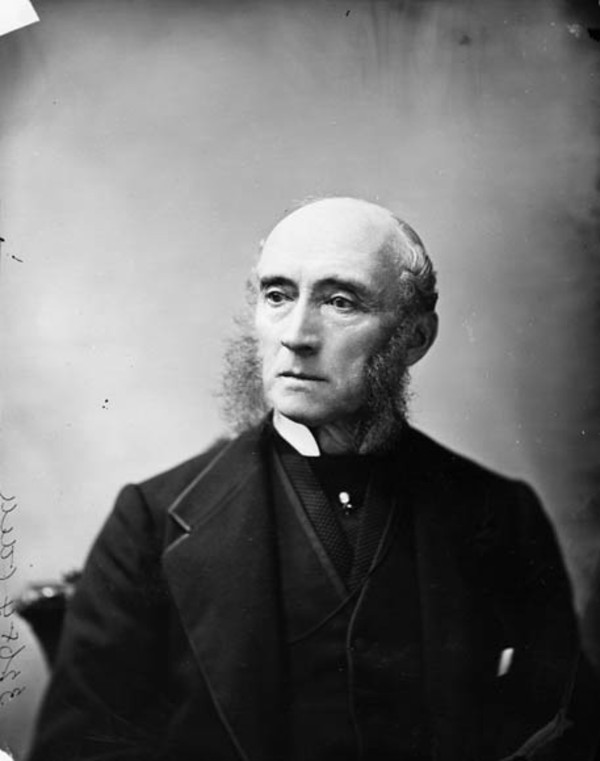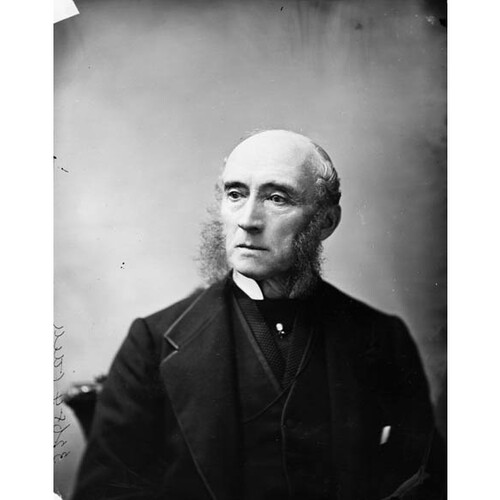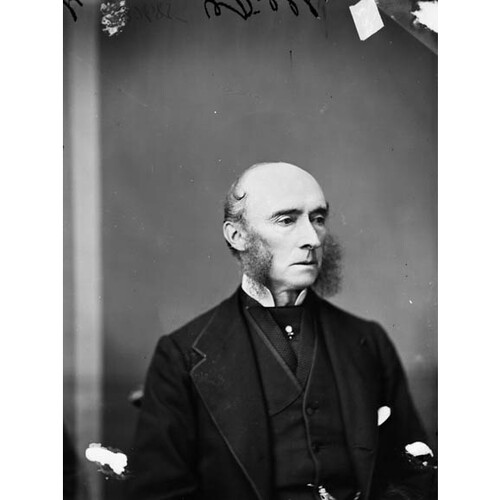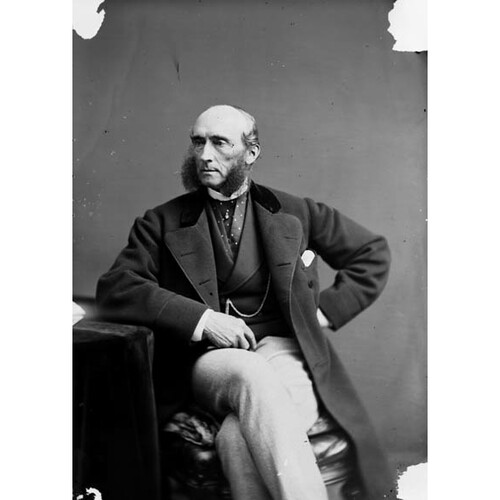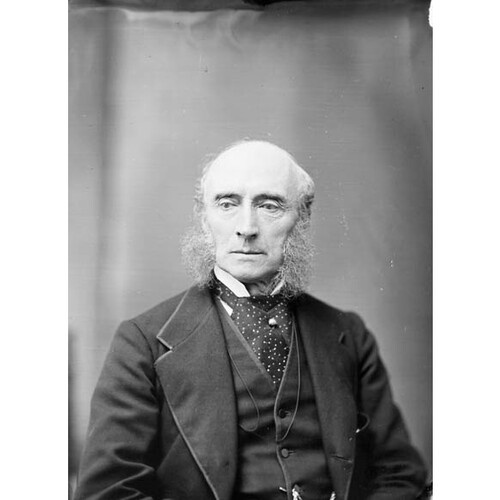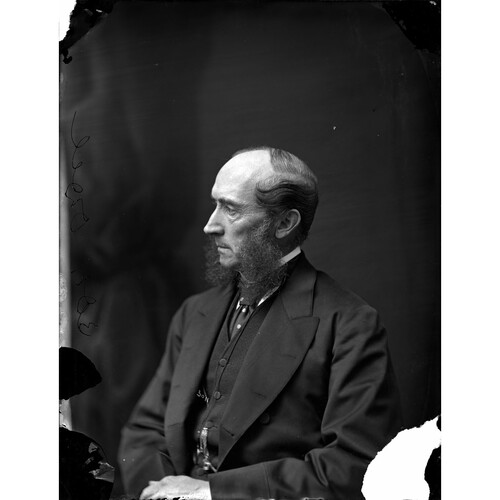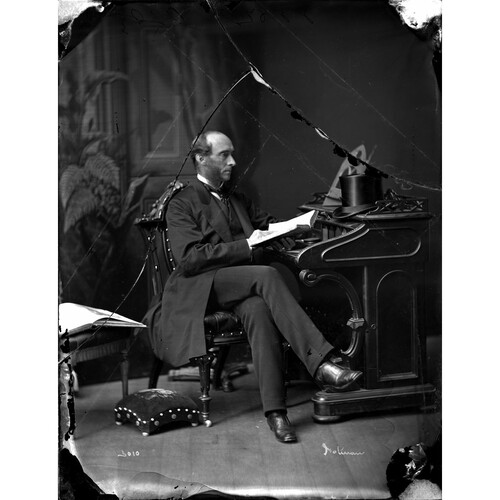ODELL, WILLIAM HUNTER, lawyer, office holder, and judge; b. 26 Nov. 1811 in Fredericton, son of William Franklin Odell* and Elizabeth Newell; m. 18 Sept. 1849 Elizabeth Ann Bliss in Halifax, and they had four daughters and a son; d. there 26 July 1891.
Named in honour of Major-General Martin Hunter*, William Hunter Odell was at the centre of a dazzling web of connections which rather overshadow the last of the notable Odells. His paternal grandfather was the Reverend Jonathan Odell*, the loyalist poet and New Brunswick provincial secretary. One of his sisters married the powerful surveyor general Thomas Baillie*. His wife was a daughter of Nova Scotia Supreme Court judge William Blowers Bliss*, the son of Chief Justice Jonathan Bliss* of New Brunswick and virtually adopted son of Chief Justice Sampson Salter Blowers* of Nova Scotia; her sisters married bishops Hibbert Binney* of Nova Scotia and James Butler Knill Kelly* of Newfoundland.
Reared in Fredericton and educated at King’s College, William Hunter Odell was admitted an attorney on 18 July 1835 and a barrister on 8 Feb. 1838. One of the fixed features of loyalist office-holding in New Brunswick was the attempt to pass preferment on to a son, of which the 60-year tenure of Jonathan and William Franklin Odell as provincial secretary and clerk of the Council was the most conspicuous example. By the time the third Odell’s career was to be launched such blatant nepotism was no longer uncontroversial. Thus, when in 1837 the departing lieutenant governor, Sir Archibald Campbell, was induced to appoint young Odell to the lucrative situation of clerk of the crown in the Supreme Court though he was absent from the province and not yet a barrister, the outrage was such that the newly arrived Sir John Harvey* was soon persuaded to supplant him in favour of George Frederick Street Berton*. Despite Harvey’s enmity towards the Odells and despite a discreditable confrontation with drunken soldiers in the streets of Fredericton, Odell was allowed to act as his father’s deputy provincial secretary from 1838 to 1844, and from 1839 was clerk of the Executive Council. In 1847 he was made a judge of the Court of Common Pleas for York County.
Odell was appointed to the Legislative Council in 1850 and, in genteel succession, to the Canadian Senate in 1867, where he attended faithfully but spoke rarely. An inoffensive conservative, he was involved in public politics only as postmaster general in Albert James Smith*’s short-lived anti-confederate administration, from 1865 to 1866. His contribution to the anti-confederate cause consisted chiefly of the pseudonymous verse satire The federation spider’s web which, though perhaps surprising doggerel from a grandson of Jonathan Odell, hit comically at its mostly Upper Canadian targets.
Odell is now remembered only as the last New Brunswicker to fight a duel, for which Bishop John Medley excommunicated him in 1848. At his death his Senate colleagues mourned him simply as a dignified gentleman of impeccable pedigree, an epitaph the last of the New Brunswick Odells would not have disdained. For some years before he died Senator Odell had lived in Halifax. When the last of his four spinster daughters – recalled by memoirist Charles Stewart Almon Ritchie* as “foolish, ugly, innocent ladies . . . their silks creaking, their gold bangles tinkling” – died there in 1937 the Odell line in the Maritimes became extinct.
[There appears to be little doubt that William Hunter Odell is the author of The federation spider’s web; a serio-comic, politic ode, suited to the times; by Dorothea Doggerel, spinster, edited by herself, cum privilegio of her sex (n.p., 1865). There is no internal evidence indicating his authorship, although the phrase cum privilegio points strongly to a lawyer. All of the still locatable copies are from the Odell estate (the N.B. Museum has three) and one has the ascription “written by William Hunter Odell” entered in the hand of a mature female of the last century, presumably one of his daughters.
Apart from commissions of office and property papers, the Odell family papers at the N.B. Museum contain nothing on William Hunter. The museum’s Odell library does, however, have a large selection of his books, as well as those of his father and grandfather. d.g.b.]
National Library of Wales (Aberystwyth), G. C. Lewis papers, Head-Lewis corr. (mfm. at NA). N.B. Museum, W. F. Ganong papers, box 42 (John Harvey, letter-book, 1837–38); Sir John Harvey papers, letter-books (transcripts at NA); Merritt family papers. PANB, MC 223, John Medley, act-book; RG 3, RS307, A2; RG 5, RS32, C. Can., Senate, Debates, 1867–71, 1873–74, 1876–91. J. H. [Gatty] Ewing, Canada home: Juliana Horatia Ewing’s Fredericton letters, 1867–1869, ed. Margaret Howard Blom and T. E. Blom (Vancouver, 1983). Rufus King, “Memoir of Hon. William Hunter Odell,” New-England Hist. and Geneal. Reg. (Boston), 46 (1892): 20–22. MacNutt, New Brunswick. C. [S. A.] Ritchie, The siren years: a Canadian diplomat abroad, 1937–1945 (Toronto, 1974).
Cite This Article
D. G. Bell, “ODELL, WILLIAM HUNTER,” in Dictionary of Canadian Biography, vol. 12, University of Toronto/Université Laval, 2003–, accessed April 1, 2025, https://www.biographi.ca/en/bio/odell_william_hunter_12E.html.
The citation above shows the format for footnotes and endnotes according to the Chicago manual of style (16th edition). Information to be used in other citation formats:
| Permalink: | https://www.biographi.ca/en/bio/odell_william_hunter_12E.html |
| Author of Article: | D. G. Bell |
| Title of Article: | ODELL, WILLIAM HUNTER |
| Publication Name: | Dictionary of Canadian Biography, vol. 12 |
| Publisher: | University of Toronto/Université Laval |
| Year of revision: | 1990 |
| Access Date: | April 1, 2025 |


